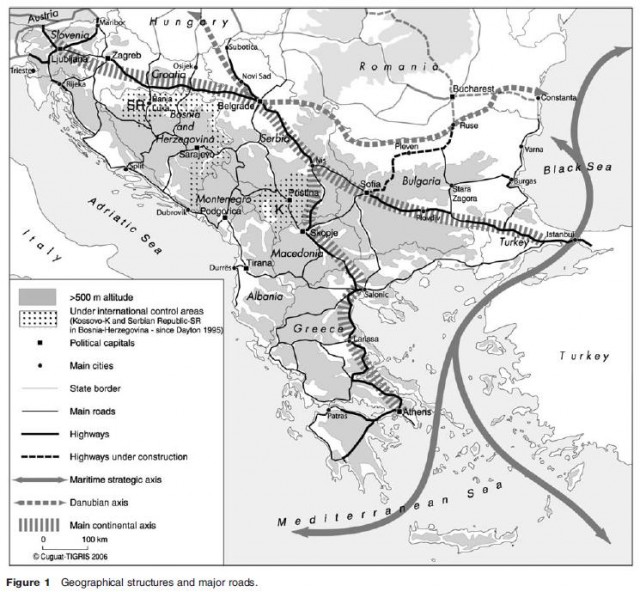Balkans
The Meaning of the Word 'Balkan', the Border Issue
Defining what the Balkans are is a complex question from the outset, because of the interweaving of fact and representation. Balkan is a Turkish word meaning 'mountain' referring to the Stara Planina, the east–west mountain range that cuts across Bulgaria. The German geographer Zeune used the term Balkan peninsula to identify the eastern Europe peninsula that extends into the Mediterranean. The northern limit is conventionally formed by the Danube and the Drava, the two rivers that do not possess particular geographical significance. From a historical viewpoint, the Balkan space corresponds to the area of Europe that has been culturally impregnated by the Ottoman domination. References to the Ottoman past appeared at the end of the nineteenth century when wars arose between local peoples seeking to establish their territories in areas left by the withdrawal of the Ottoman occupation. The term 'balkanization' became synonymous with the geopolitical instability resulting from lasting fragmentation into small, unstable, hostile political units, involving the risk of war for an area reaching beyond the conflict zones. Balkanization has become a generic term with a negative connotation that the inhabitants of the region dislike, and it is at present the subject of critical examination of how mental representations are constructed and deconstructed, involving consideration of the negative 'invention' or projection of 'otherness', possibly characteristic of Western thought in the construction of its civilization of domination.
The terms Balkan and balkanization in relation to geopolitical realities and mental representations have had a contrasted history in the last half century, disappearing during the Soviet phase, and reappearing after 1990: following the geopolitical demise of Eastern Europe, Central and Balkan Europe recovered their respective identities, and the wars in Yugoslavia reactivated the negative connotation of the word Balkan, which it is more appropriate to analyze than to criticize (Figure 1).

In a regional geography approach, the question of delimitation is a means of encompassing identity, the spatial core, and the blurred fringes. The central core articulates around Belgrade, Sarajevo, Tirana, Salonica, and Sofia, with its predominantly continental and mountainous structure; the northern fringes are the Slovenian Alps, the middle and lower Danube basin, and to the south maritime Greece and the Turkish area of Thrace. But the particularly marked fluctuations of borders suggest that it is important to distinguish between the geographical approach and the geopolitical approach, a key to the volatile and dangerous configurations of the region.
A Geopolitical Region Where Major Powers Meet: The East, the West, an 'In-Between' Europe
Balkan Civilization – Similarity Is Not Synonymous with Cohesion